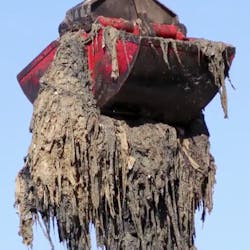WaterWorld Newscast - March 9, 2020
The following is a transcript of the WaterWorld Newscast for the week of March 9, 2020.
Hi, I'm Angela Godwin, bringing you water and wastewater news headlines for the week of March 9. Coming up...
- Toilet paper shortage leads to 'coronavirus fatberg' in Australia
- $7.4M grant to fund research on PFAS toxicity
- Advisory board says 'Navigable Waters' rule lacks science
- Shifting the water finance paradigm, with special guest Michael Gardner
[story1]
Hunter Water, in New South Wales, cited the recent toilet paper shortage as a factor in the blockage at its Morpeth Wastewater Treatment Works facility.
Fears of extended quarantine due to coronavirus have resulted in residents stockpiling toilet paper and other sanitation items, leaving grocery store shelves empty and forcing people to find alternatives like wet wipes and paper towels that do not break down.
Hunter Water is reminding people to please only flush the three P's.
[story2]
The funding, from the National Institute of Environmental Health Sciences Superfund Research Program, will be used to establish a Center for Environmental and Human Health Effects of Per- and Polyfluoroalkyl Substances.
Among its objectives, the center will develop new analytical methods for the detection of this class of compounds.
It will also train the next generation of environmental health researchers and foster partnerships with government and community stakeholders to educate the public and advance protection of human health.
[story
The panel of more than forty scientists from across the country concluded that the "Navigable Waters Rule" decreases protection for our nation's waters and is not consistent with the overall objective of the Clean Water Act.
Specifically, among its findings, the SAB commented on the adjacency of subsurface waters. The board noted that "there is no scientific justification for excluding connected groundwater from [waters of the U.S.) if spring-fed creeks are considered to be jurisdictional."
The SAB believes that the proposed definition is "inconsistent with the body of science previously reviewed by the SAB, while no new science has been presented."
Our water and wastewater infrastructure is deteriorating at a rate that outpaces available funding. Do smart data technologies like artificial intelligence and machine learning present an opportunity to free up more capital? Here to discuss is Michael Gardner, CEO of Silicon Valley startup Aqaix. Michael thanks for joining us.
[...]
You've said there are huge opportunities to use data technologies in water but that the data itself is not enough. Can you explain?
[...]
You've developed a cloud platform that uses data and AI to expand access to capital. How does it work?
[...]
You're working with a water technology accelerator -- The Water Tower -- in Gwinnett County, Georgia. How is your platform being used there?
[...]
Where do you see the water sector headed in terms of adoption of these advanced data technologies?
[...]
Michael, thank you for joining us.
[OUTRO]
For Endeavor Business Media, I'm Angela Godwin. Thanks for watching.



